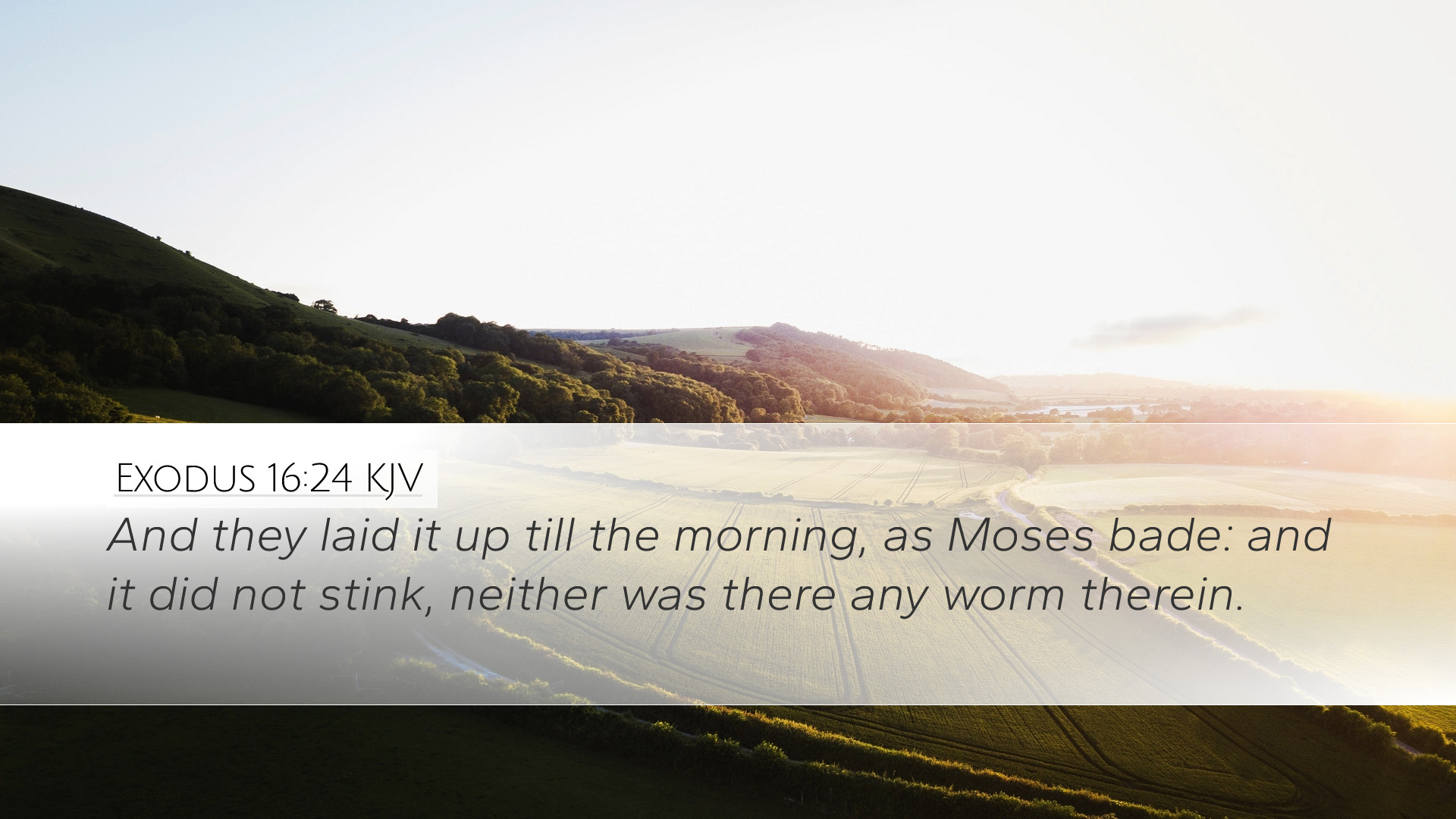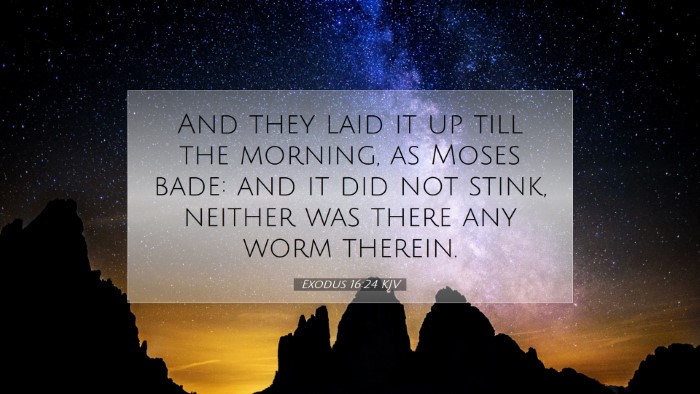Exodus 16:24 - Bible Commentary
Verse Context: Exodus 16:24 describes the command of God regarding the gathering of manna, illustrating the principles of divine provision and human obedience. This verse reads: "And they laid it up till the morning, as Moses bade: and it did not stink, neither was there any worm therein." Here, we see the faithfulness of God's provision and the necessity of adhering to His instructions.
Key Themes
- Divine Provision: The gathering of manna serves as a profound illustration of God’s sustenance for His people during their time in the wilderness.
- Obedience to God's Command: The actions of the Israelites in laying up the manna as instructed by Moses highlight the importance of obedience to divine commands.
- Preservation of God’s Gifts: The statement concerning the manna not spoiling emphasizes God's provision's purity and longevity when it's adherent to His will.
Commentary Insights
Matthew Henry's Commentary:
Matthew Henry emphasizes the miraculous nature of the manna. In Exodus 16, he notes how God provided for the Israelites with sustenance that required no labor to cultivate. The specific instruction given by Moses about not allowing the manna to spoil reflects God's desire for His people to trust Him daily. Henry highlights that the Israelites were to gather their daily bread, symbolic of our reliance on God for our spiritual nourishment, reminiscent of Jesus' teaching on the Bread of Life.
Albert Barnes' Notes:
Albert Barnes draws attention to the specifics of God’s command regarding the gathering of manna. He explains that the obedience demonstrated by the Israelites was crucial in maintaining the integrity of God’s provision. This verse, particularly, speaks to the importance of following divine instruction meticulously. Barnes also notes the significance of the manna not spoiling when stored overnight, which serves to illustrate the faithfulness of God—His gifts do not decay or diminish in power when we adhere to His commands. This mirrors the idea that those who trust in the Lord will find their needs abundantly met.
Adam Clarke's Commentary:
Adam Clarke provides an in-depth exploration of the theological implications of the provision of manna. He observes that the incident recorded in Exodus 16 is not merely about physical sustenance but serves as an allegory for spiritual nourishment. Clarke suggests that the unwavering nature of the manna, which neither stank nor produced worms, is akin to the enduring nature of God's Word and its nourishment for the soul. He further elucidates how this act demonstrates God's might and intention to teach His people resilience in faith while simultaneously establishing their dependence on Him.
Theological Reflections
Dependence on God:
The principle of daily provision is foundational to Christian trust in God's sovereignty. Just as the Israelites needed to gather manna each day, so believers are called to seek God daily, understanding that spiritual sustenance is not to be hoarded but shared and continually renewed.
God's Faithfulness:
The preservation of the manna serves as a reminder that God's gifts are perfect and remain intact when kept within His prescribed order. This teaches modern-day believers about the need to preserve the integrity of God's provision in their lives through proper stewardship and obedience.
Practical Application
- Daily Devotion: Like the Israelites, believers should seek God each day through prayer and scripture reading, knowing that He provides guidance for daily sustenance.
- Listening to God’s Voice: Emphasizing the importance of obedience, pastors and teachers can encourage congregations to remain attuned to God’s directives in their lives.
- Sharing God’s Gifts: Manna was to be shared; similarly, spiritual blessings should be invested back into the community, fostering a spirit of generosity and gratitude.
Conclusion
The commentary on Exodus 16:24 illustrates that the provision of manna is a multifaceted lesson about faith, obedience, and reliance on God. Through the insights of noted commentators such as Matthew Henry, Albert Barnes, and Adam Clarke, it is clear that this narrative encourages us to trust deeply in God’s daily provisions while remaining faithful stewards of His gifts. In an era of uncertainties, the principles derived from this scripture remain relevant, urging both scholars and laypeople alike to seek God with earnest hearts.


